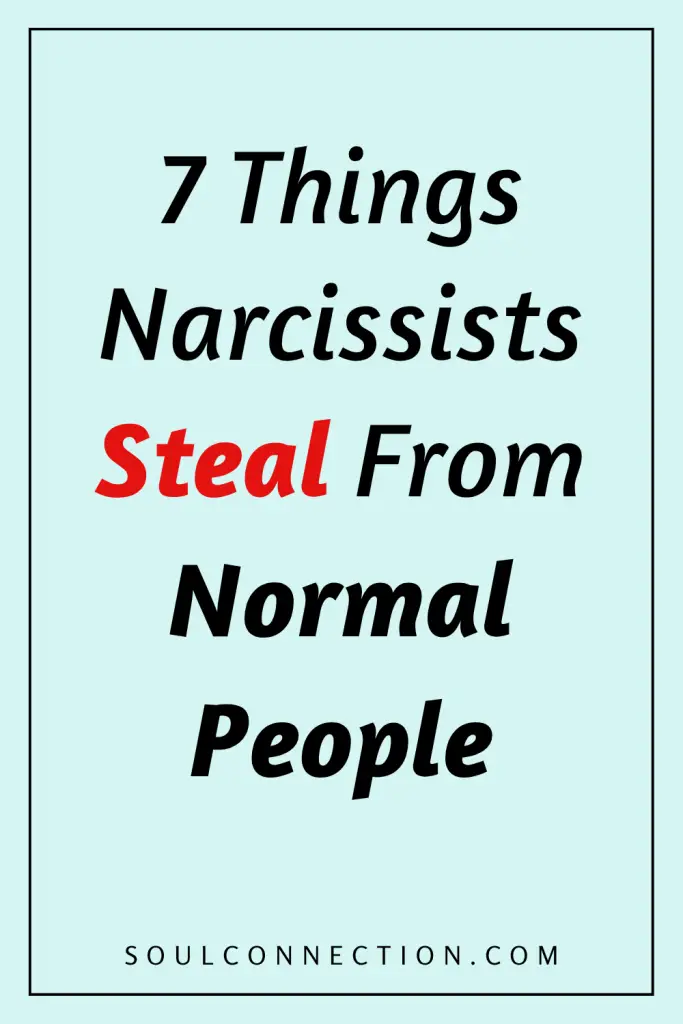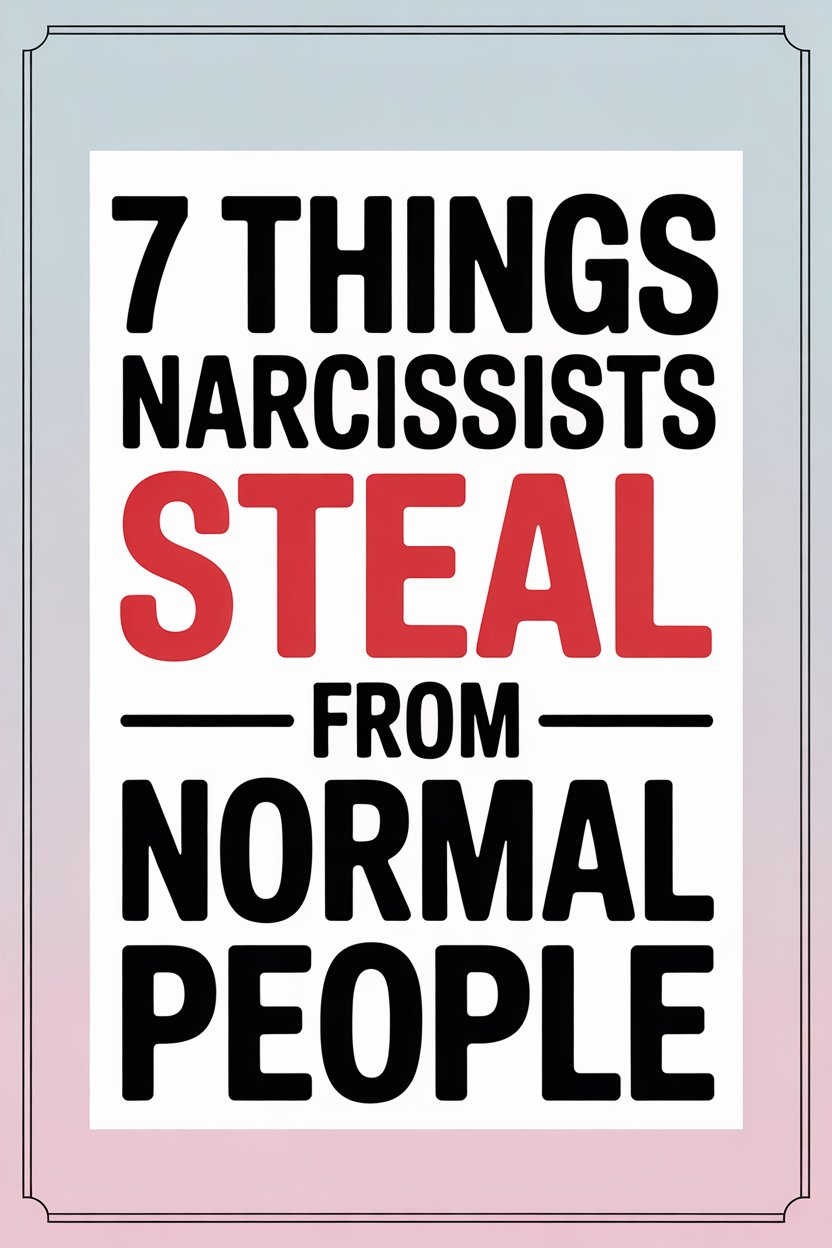Ever had the sneaking suspicion someone was robbing you—emotionally, mentally, maybe even of your last Kit-Kat—without ever touching your wallet?
Welcome to the world of narcissists, where theft is an art form, and the loot goes way beyond material things.
If you’ve tangled with a narcissist, you already know: they can leave you feeling like you’ve been through an emotional tumble dryer on “extra spin.”
Let’s pull back the curtain on exactly what gets quietly pinched when you’re tangled up with someone who thinks the sun rises just to see them smile.
1. Time You Can Never Get Back
Narcissists are absolute pros at wasting time—but not their own, naturally.
They’ll suck up hours, days, even years of your life, all while you’re busy walking on eggshells, replaying conversations in your head, or googling “How to argue with someone who is always right (and wrong).”
All those long, drawn-out “discussions” where nothing gets resolved? The endless apologies for things you didn’t do? That’s your precious time circling the drain.
You could have learned Spanish, picked up the ukulele, or taken up extreme ironing—anything more productive than trying to make sense of their logic.
If you find yourself sacrificing hobbies, friendships, or sleep just to keep them happy (or, more accurately, not angry), consider this your sign that your time is being hijacked.
Reclaiming your hours starts with saying no. Yes, even if it’s just to their Tuesday night rant about how their barista is out to get them.
2. Confidence That Took Years to Build
Ah, confidence. The thing you spent years building—like a Jenga tower, except now someone keeps yanking out pieces while laughing about your “overreactions.”
Narcissists have an uncanny ability to make even the most self-assured person second-guess their every move.
They’ll twist compliments into criticisms, downplay your achievements, and sprinkle just enough charm to make you think you’re imagining it all. (“Oh, darling, I never said you look tired—I said you’re glowing with exhaustion. It’s different.”)
Gaslighting is a favorite tool, and it works like a charm to erode your faith in your own memory, judgment, and basic worth as a human.
If you find yourself apologizing for existing or hesitating before sharing your opinions, ask yourself: who put that doubt there in the first place?
3. Boundaries That Once Kept You Sane
Boundaries, you say? Narcissists see them as a personal challenge. Rather than respecting your limits, they treat them like speed bumps—annoying, but easily flattened if you drive fast enough.
Maybe you wanted a quiet night in, but suddenly you’re hosting their friends (and their dog) because “you’re just so good at entertaining.”
Perhaps you’ve said you’re busy, only to get bombarded with texts, calls, and a guilt-trip about not caring enough.
Little by little, your boundaries shift to accommodate their needs. Before you know it, your “me time” has become “their time,” and your opinions on how to spend weekends are about as relevant as a Blockbuster card.
Healthy boundaries are the fence that keeps your garden from being trampled. It’s time to mend those fences and start locking the gate.
4. Emotional Energy (Batteries Not Included)
Relationships run on emotional energy. With a narcissist, it’s like plugging your phone into a charger that secretly drains it. You give, they take—and somehow you end up running on 3% with no charger in sight.
Emotional support? Sure, but only one way. Your feelings and needs are background noise unless they play into the narcissist’s never-ending need for validation.
The more you try to please them, soothe them, or rescue them from their own drama, the more depleted you feel.
Notice how exhausted you are after a single conversation? That’s no accident. It’s emotional pickpocketing, and it can leave you questioning whether you’re just “too sensitive” (spoiler: you’re not).
Give yourself permission to unplug. Not every crisis is your emergency to handle, and sometimes the healthiest response is, “Sorry, my battery’s dead.”
5. Authenticity (Trust Me, You Miss It)
It’s hard to be yourself around someone who’s allergic to criticism, obsessed with appearances, and only interested in a version of you that fits their storyline.
Gradually, you start hiding parts of who you are—your opinions, quirks, even your laughter—just to keep the peace.
You become a pro at editing yourself, avoiding topics, and pretending you’re “fine” when you’re not. This kind of shape-shifting is exhausting and, over time, you might even forget what it feels like to be unapologetically you.
Authenticity is the secret sauce that makes relationships rich and rewarding. If you’re pretending more than you’re living, it’s time to rediscover the person you were before the audition for “Best Supporting Role in a Narcissist’s Life.”
6. Relationships With Others
Narcissists are not big fans of sharing the spotlight. The more isolated you are, the easier you are to control, which is why your friendships, family connections, and outside interests suddenly become a “problem.”
Watch how they subtly (or not so subtly) undermine your closest relationships: “Oh, your friend is just jealous of our love,” or “Your family never appreciates you like I do.”
Before long, you’re spending less time with people who might actually remind you of your worth.
Suddenly, your social calendar is emptier, and the people who once grounded you feel miles away. It’s not an accident—it’s a strategy.
Rebuilding those bridges can feel awkward after so long, but every WhatsApp chat, coffee catch-up, or family dinner is a crack in the narcissist’s hold.
7. Joy (Yes, Even Yours)
Narcissists are experts at turning even your happiest moments into a minor inconvenience for them.
That promotion at work? “Well, now you’ll be too busy for me.” A new hobby? “Do you have to spend so much time on that?” Your birthday? “I hope you don’t mind if we celebrate by watching my favorite movie.”
The more you try to celebrate, the more they find a way to rain on your parade. Gradually, you stop sharing good news or downplay your excitement.
Life turns gray, and moments that should be sweet are tinged with anxiety about how the narcissist will react.
Guarding your joy is not selfish—it’s survival. When you start protecting your happiness, you reclaim the color and sparkle in your life, bit by bit.
Taking Back What’s Yours
Here’s the good news: everything a narcissist steals, you can reclaim.
Time gets managed differently when you stop negotiating every boundary. Confidence returns the minute you trust your perspective again.
Friendships, laughter, the freedom to say no, the power to say yes—these are all still yours, a little battered, maybe, but waiting to be dusted off.
It’s not about fixing the narcissist (spoiler: you can’t), but about re-learning to prioritize yourself. Most of all, it’s giving yourself permission to want—and take back—what was always yours to begin with.
Turns out the best revenge isn’t living well. It’s living well, loudly, with all your pieces intact.


